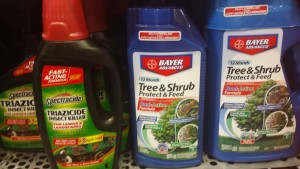Earlier this year several big box store and regional independent garden center chains announced that the plants they sell in 2016 will be “neonicotinoid-free”. Large regional nurseries and greenhouse operations are also jumping on-board the anti-neonic bandwagon. This means that pesticides containing the ingredient acetamiprid and imidacloprid are members of the neonicotinoid class, and are forbidden to be sprayed on plants sold at these stores.
Neonic insecticides are thought to be harmful to bees. Studies have shown that small amounts of neonics can harm bees feeding on the pollen and the nectar of treated plants and larger doses can kill. More and more gardeners are making it a point to stop using insecticides that contain neonics and to buy only plants not treated with these pesticides.
Terms like “bee-friendly” and “use of beneficial insects” carry greater value. Plant growers are learning that the term “bee-friendly” delivers a more positive message with buyers.
Neonic pesticides include: imidacloprid, acetamiprid, clothianidin, dinotefuran, nithiazine, thiacloprid and thiamethoxam. A short list of popular brand names pesticides that contain the ingredient Imidaclopyrid include: several Bayer Advanced™ Products, Ferti-lome 2-N-1 Systemic, Hi-Yield Systemic Insect Spray, Marathon, Merit, Ortho Bug B Gon® Year-Long Tree & Shrub Insect Control.
Neonics, imidacloprid in particular, are commonly applied to plants as foliar sprays and soil drenches. Because these pesticides are systemic, they’re taken up by the entire plant and can even spread into the surrounding soil. Depending on the type of neonic and amounts used, one application of a foliar spray can last up to 4 – 5 months in herbaceous plants and a year or more in woody plants. Soil drenches, which are commonly used on roses and trees, can last two or more years in the plant leaves (needles), twigs, and root system. Treated seeds will carry through the pesticide inside the developing plant.
Be aware: Imidaclopyrid is still sold by most of these garden centers.


 Posted in
Posted in 
